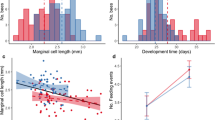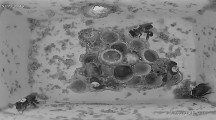Abstract
The ontogeny of nectar robbing by pollinators is not well understood. In this study, we investigated the interplay of pre-existing biases and experience in the expression of nectar-robbing behavior by common eastern bumble bee (Bombus impatiens) workers. Flower-naïve bees were released individually into an arena containing six live Tecoma stans flowers in one of two treatments. One treatment consisted of open flowers bearing a single artificial slit, allowing the bee to rob or enter legitimately for nectar, while the other consisted of flowers bearing slits, whose corollas were plugged with cotton, requiring the bee to rob for nectar. A subset of bees was tested twice, once on each treatment; the order of treatments was balanced across bees. Results showed that first attempts by flower-naïve bees were biased nearly absolutely towards legitimate visitation regardless of flower treatment. Most bees in both treatment groups robbed over the course of a trial, but plugged flowers were robbed significantly more. Previous experience affected robbing frequency on subsequent visits, suggestive of learning; bees induced to rob on plugged flowers tended to continue to rob even when legitimate access was restored. We speculate that the initial bias towards legitimate visits is due to the flower corolla’s distinctive odor and nectar guides, to which bees respond innately. Bees nevertheless readily learn to rob, particularly when it is the only option for extracting nectar. Our findings support the view that studies of cognition are essential to understanding the pattern of cooperation and conflict in plant-pollinator mutualism.
Significance statement
Nectar-robbing behavior is widely observed among pollinators in nature. Unlike visitation of flowers through the floral entrance, nectar robbing often does not transfer pollen. However, despite the importance of nectar robbing on plant fitness, little is known about the ontogeny of nectar-robbing behavior. In this study, we found that naïve Bombus impatiens workers strongly preferred legitimate visits over nectar robbing on their first visits to live flowers. However, bees quickly switched to nectar robbing when nectar could not be accessed legitimately and continued robbing even when legitimate access is restored. Our results suggest that flowers may take advantage of their pollinators’ innate responses for their own or mutual gain, but also that pollinators can overcome this manipulation through learning.





Similar content being viewed by others
Data availability
All data and code are available as electronic supplementary material.
References
Arnqvist G (2020) Mixed models offer no freedom from degrees of freedom. Trends Ecol Evol 35:329–335. https://doi.org/10.1016/j.tree.2019.12.004
Barker JL, Dornhaus A, Bronstein JL, Muth F (2018) Learning about larceny: experience can bias bumble bees to rob nectar. Behav Ecol Sociobiol 72:68. https://doi.org/10.1007/s00265-018-2478-6
Bronstein JL, Barker JL, Lichtenberg EM, Richardson LL, Irwin RE (2017) The behavioral ecology of nectar robbing: why be tactic constant? Curr Opin Insect Sci 21:14–18. https://doi.org/10.1016/j.cois.2017.05.013
Brooks ME, Kristensen K, van Benthem KJ, Magnusson A, Berg CW, Nielsen A, Skaug HJ, Maechler M, Bolker BM (2017) glmmTMB balances speed and flexibility among packages for zero-inflated generalized linear mixed modeling. R J 9:378–400
Burkle LA, Irwin RE, Newman DA (2007) Predicting the effects of nectar robbing on plant reproduction: implications of pollen limitation and plant mating system. Am J Bot 94:1935–1943. https://doi.org/10.3732/ajb.94.12.1935
Cameron SA, Lozier JD, Strange JP, Koch JB, Cordes N, Solter LF, Griswold TL (2011) Patterns of widespread decline in North American bumble bees. Proc Natl Acad Sci 108:662–667. https://doi.org/10.1073/pnas.1014743108
Chittka B (1998) Sensorimotor learning in bumblebees: long-term retention and reversal training. J Exp Biol 201:515–524. https://doi.org/10.1242/jeb.201.4.515
Chittka L (2022) The mind of a bee. Princeton University Press, Princeton
Chittka L, Dyer AG, Bock F, Dornhaus A (2003) Psychophysics: bees trade off foraging speed for accuracy. Nature 424:388
Chittka L, Thomson JD, Waser NM (1999) Flower constancy, insect psychology, and plant evolution. Naturwissenschaften 86:361–377
Dedej S, Delaplane KS (2005) Net energetic advantage drives honey bees (Apis mellifera L) to nectar larceny in Vaccinium ashei Reade. Behav Ecol Sociobiol 57:398–403. https://doi.org/10.1007/s00265-004-0852-z
Doebeli M, Knowlton N (1998) The evolution of interspecific mutualisms. Proc Natl Acad Sci 95:8676–8680. https://doi.org/10.1073/pnas.95.15.8676
Fox J, Weisberg S (2019) An R companion to applied regression, 3rd edn. Sage, Thousand Oaks CA
Gegear RJ, Laverty TM (1998) How many flower types can bumble bees work at the same time? Can J Zool 76:1358–1365
Giurfa M, Núñez J, Chittka L, Menzel R (1995) Colour preferences of flower-naive honeybees. J Comp Physiol A 177:247–259
Goulson D, Park KJ, Tinsley MC, Bussière LF, Vallejo-Marin M (2013) Social learning drives handedness in nectar-robbing bumblebees. Behav Ecol Sociobiol 67:1141–1150. https://doi.org/10.1007/s00265-013-1539-0
Goulson D, Stout JC, Langley J, Hughes WOH (2000) Identity and function of scent marks deposited by foraging bumblebees. J Chem Ecol 26:2897–2911. https://doi.org/10.1023/A:1026406330348
Gumbert A (2000) Color choices by bumble bees (Bombus terrestris): innate preferences and generalization after learning. Behav Ecol Sociobiol 48:36–43. https://doi.org/10.1007/s002650000213
Hartig F (2022) DHARMa: residual diagnostics for hierarchical (multi-level / mixed) regression models. https://CRAN.R-project.org/package=DHARMa
Herschel I (1883) Some habits of bees and humble-bees. Nature 29:104–104. https://doi.org/10.1038/029104c0
Howard SR, Shrestha M, Schramme J, Garcia JE, Avarguès-Weber A, Greentree AD, Dyer AG (2019) Honeybees prefer novel insect-pollinated flower shapes over bird-pollinated flower shapes. Curr Zool 65:457–465. https://doi.org/10.1093/cz/zoy095
Ings TC, Chittka L (2008) Speed-accuracy tradeoffs and false alarms in bee responses to cryptic predators. Curr Biol 18:1520–1524
Inouye D (1983) The ecology of nectar robbing. In: Elias T, Bentley B (eds) The biology of nectaries. Columbia University Press, New York, pp 153–173
Irwin RE, Brody AK, Waser NM (2001) The impact of floral larceny on individuals, populations, and communities. Oecologia 129:161–168. https://doi.org/10.1007/s004420100739
Irwin RE, Bronstein JL, Manson JS, Richardson L (2010) Nectar robbing: ecological and evolutionary perspectives. Annu Rev Ecol Evol Syst 41:271–292. https://doi.org/10.1146/annurev.ecolsys.110308.120330
Laverty TM (1994) Bumble bee learning and flower morphology. Anim Behav 47:531–545. https://doi.org/10.1006/anbe.1994.1077
Laverty TM, Plowright RC (1988) Flower handling by bumblebees: a comparison of specialists and generalists. Anim Behav 36:733–740. https://doi.org/10.1016/S0003-3472(88)80156-8
Leadbeater E, Chittka L (2008) Social transmission of nectar-robbing behaviour in bumble-bees. Proc R Soc B Biol Sci 275:1669–1674. https://doi.org/10.1098/rspb.2008.0270
Lehrer M, Horridge GA, Zhang SW, Gadagkar R (1995) Shape vision in bees: innate preference for flower-like patterns. Philos Trans R Soc Lond B Biol Sci 347:123–137. https://doi.org/10.1098/rstb.1995.0017
Lenth RV (2022) emmeans: estimated marginal means, aka least-squares means. https://CRAN.R-project.org/package=emmeans
Leonard AS, Brent J, Papaj DR, Dornhaus A (2013) Floral nectar guide patterns discourage nectar robbing by bumble bees. PLoS ONE 8:e55914. https://doi.org/10.1371/journal.pone.0055914
Leonard AS, Papaj DR (2011) ‘X’ marks the spot: the possible benefits of nectar guides to bees and plants: nectar guides and bumblebee foraging. Funct Ecol 25:1293–1301. https://doi.org/10.1111/j.1365-2435.2011.01885.x
Lichtenberg EM, Irwin RE, Bronstein JL (2020) Bumble bees are constant to nectar-robbing behaviour despite low switching costs. Anim Behav 170:177–188. https://doi.org/10.1016/j.anbehav.2020.09.008
Lichtenberg EM, Irwin RE, Bronstein JL (2018) Costs and benefits of alternative food handling tactics help explain facultative exploitation of pollination mutualisms. Ecology 99:1815–1824. https://doi.org/10.1002/ecy.2395
Lunau K (1992) Innate recognition of flowers by bumble bees: orientation of antennae to visual stamen signals. Can J Zool 70:2139–2144. https://doi.org/10.1139/z92-288
Lunau K, Wacht S, Chittka L (1996) Colour choices of naive bumble bees and their implications for colour perception. J Comp Physiol A 178:477–489
Lynn SK, Cnaani J, Papaj DR (2005) Peak shift discrimination learning as a mechanism of signal evolution. Evolution 59:1300–1305
Maloof JE (2001) The effects of a bumble bee nectar robber on plant reproductive success and pollinator behavior. Am J Bot 88:1960–1965. https://doi.org/10.2307/3558423
Maloof JE, Inouye DW (2000) Are nectar robbers cheaters or mutualists? Ecology 81:2651–2661. https://doi.org/10.1890/0012-9658(2000)081[2651:ANRCOM]2.0.CO;2
Menzel R (1999) Memory dynamics in the honeybee. J Comp Physiol [a] 185:323–340. https://doi.org/10.1007/s003590050392
Nagano Y, Yokoi T (2022) Honeybees with extensive foraging experience rob nectar more frequently. Sci Nat 109:11. https://doi.org/10.1007/s00114-021-01781-7
Olesen JM (1996) From naivete to experience: bumblebee queens (Bombus terrestris) foraging on Corydalis cava (Fumariaceae). J Kansas Entomol Soc 69:274–286
Papaj DR, Buchmann SL, Russell AL (2017) Division of labor of anthers in heterantherous plants: flexibility of bee pollen collection behavior may serve to keep plants honest. Arthropod-Plant Interact 11:307–315. https://doi.org/10.1007/s11829-017-9497-5
Pelton J (1964) A survey of the ecology of Tecoma stans. Butler University Botanical Studies 53–88
R Core Team (2022) R: a language and environment for statistical computing. R Foundation for Statistical Computing, Vienna, Austria. https://www.r-project.org/
Raine NE, Chittka L (2008) The correlation of learning speed and natural foraging success in bumble-bees. Proc R Soc B Biol Sci 275:803–808. https://doi.org/10.1098/rspb.2007.1652
Raine NE, Chittka L (2007) The adaptive significance of sensory bias in a foraging context: floral colour preferences in the bumblebee Bombus terrestris. PLoS ONE 2:e556. https://doi.org/10.1371/journal.pone.0000556
Raine NE, Chittka L (2012) No trade-off between learning speed and associative flexibility in bumblebees: a reversal learning test with multiple colonies. PLoS ONE 7:e45096. https://doi.org/10.1371/journal.pone.0045096
Raine NE, Ings TC, Ramos-Rodriguez O, Chittka L (2006) Intercolony variation in learning performance of a wild British bumblebee population Hymenoptera: apidae: Bombus terrestris audax. Entomol Gen 28:241
Richman SK, Barker JL, Baek M, Papaj DR, Irwin RE, Bronstein JL (2021) The sensory and cognitive ecology of nectar robbing. Front Ecol Evol 9:698137. https://doi.org/10.3389/fevo.2021.698137
Richman SK, Irwin RE, Nelson CJ, Bronstein JL (2017) Facilitated exploitation of pollination mutualisms: fitness consequences for plants. J Ecol 105:188–196. https://doi.org/10.1111/1365-2745.12657
Riveros AJ, Hernández EJ, Nates-Parra G (2006) Morphological constraints and nectar robbing in three Andean bumble bee species (Hymenoptera, Apidae, Bombini). Caldasia 28:111–114
Rodríguez I, Gumbert A, Hempel de Ibarra N, Kunze J, Giurfa M (2004) Symmetry is in the eye of the 'beeholder': innate preference for bilateral symmetry in flower-naïve bumblebees. Naturwissenschaften 91:374–377. https://doi.org/10.1007/s00114-004-0537-5
Rojas-Nossa SV, Sánchez JM, Navarro L (2016) Nectar robbing: a common phenomenon mainly determined by accessibility constraints, nectar volume and density of energy rewards. Oikos 125:1044–1055. https://doi.org/10.1111/oik.02685
Russell AL, Leonard AS, Gillette HD, Papaj DR (2016) Concealed floral rewards and the role of experience in floral sonication by bees. Anim Behav 120:83–91. https://doi.org/10.1016/j.anbehav.2016.07.024
Rust RW (1979) Pollination of Impatiens capensis: pollinators and nectar robbers. J Kansas Entomol Soc 52:297–308
Schiestl FP, Johnson SD (2013) Pollinator-mediated evolution of floral signals. Trends Ecol Evol 28:307–315. https://doi.org/10.1016/j.tree.2013.01.019
Smith JM, Szathmary E (1997) The major transitions in evolution. Oxford University Press, Oxford
Smith KE, Raine NE (2014) A comparison of visual and olfactory learning performance in the bumblebee Bombus terrestris. Behav Ecol Sociobiol 68:1549–1559. https://doi.org/10.1007/s00265-014-1765-0
Stout JC, Allen JA, Goulson D (2000) Nectar robbing, forager efficiency and seed set: bumblebees foraging on the self incompatible plant Linaria vulgaris (Scrophulariaceae). Acta Oecologica 21:277–283. https://doi.org/10.1016/S1146-609X(00)01085-7
Waser NM (1986) Flower constancy: definition, cause, and measurement. Am Nat 127:593–603
Woodward GL, Laverty TM (1992) Recall of flower handling skills by bumble bees: a test of Darwin’s interference hypothesis. Anim Behav 44:1045–1051
Acknowledgements
We gratefully acknowledge comments on this study by members of the lab group. Behavioral data were collected, and preliminary analysis was made, as part of a senior Honors Thesis by an author. We sincerely appreciate all valuable comments and suggestions from an anonymous reviewer and Dr. David Inouye, which helped us to improve the quality of the manuscript.
Funding
The University of Arizona provided funds used in this project.
Author information
Authors and Affiliations
Corresponding author
Ethics declarations
Competing interests
The authors declare no competing interests.
Additional information
Communicated by M. Giurfa
Publisher's note
Springer Nature remains neutral with regard to jurisdictional claims in published maps and institutional affiliations.
Supplementary Information
Below is the link to the electronic supplementary material.
Rights and permissions
Springer Nature or its licensor (e.g. a society or other partner) holds exclusive rights to this article under a publishing agreement with the author(s) or other rightsholder(s); author self-archiving of the accepted manuscript version of this article is solely governed by the terms of such publishing agreement and applicable law.
About this article
Cite this article
Baek, M., Bish, S.E., Giebink, N.W. et al. The interplay of experience and pre-existing bias in nectar-robbing behavior by the common eastern bumble bee. Behav Ecol Sociobiol 77, 37 (2023). https://doi.org/10.1007/s00265-023-03313-x
Received:
Revised:
Accepted:
Published:
DOI: https://doi.org/10.1007/s00265-023-03313-x




